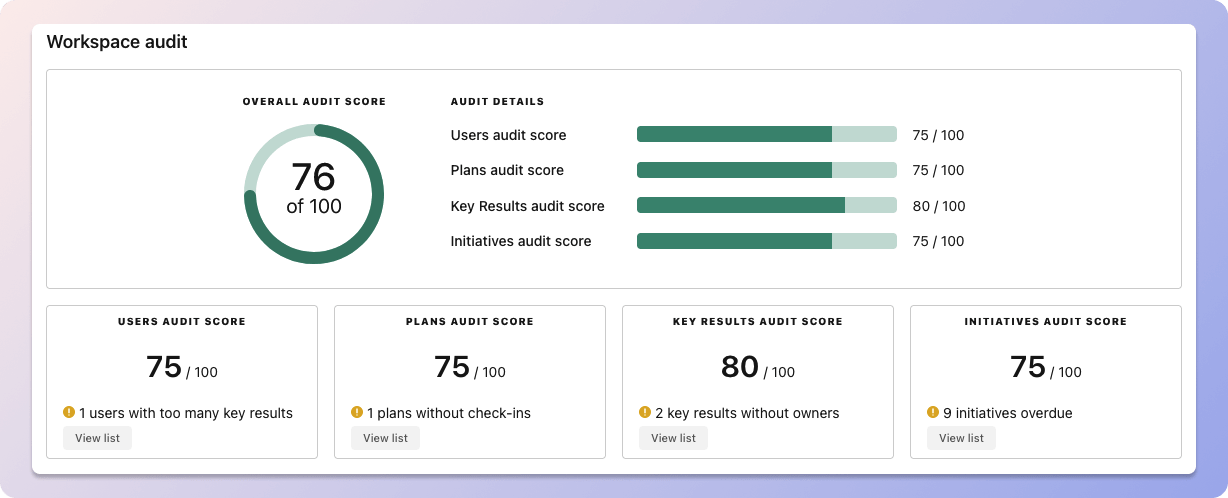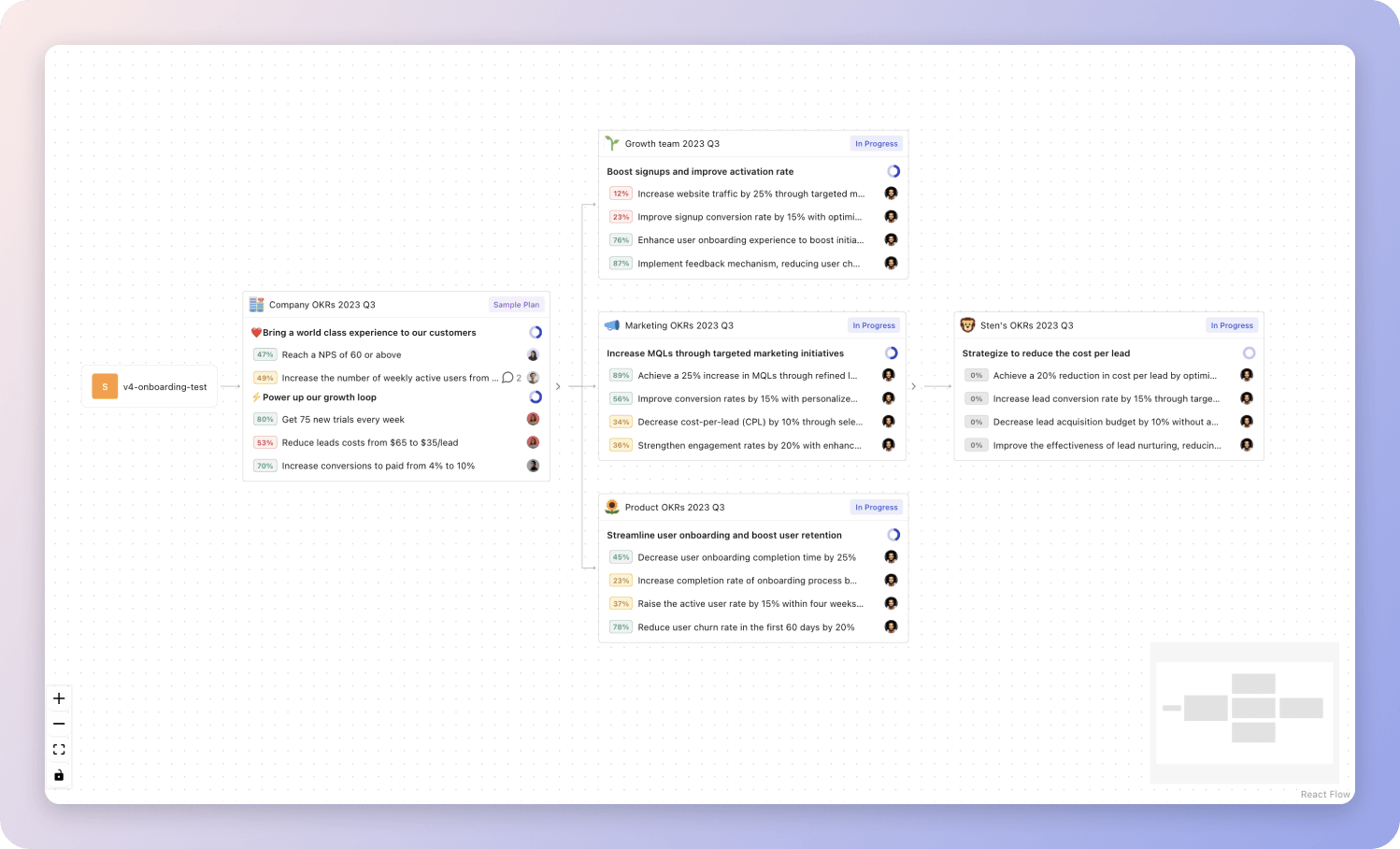2 OKR examples for Advanced Programming
What are Advanced Programming OKRs?
The Objective and Key Results (OKR) framework is a simple goal-setting methodology that was introduced at Intel by Andy Grove in the 70s. It became popular after John Doerr introduced it to Google in the 90s, and it's now used by teams of all sizes to set and track ambitious goals at scale.
Formulating strong OKRs can be a complex endeavor, particularly for first-timers. Prioritizing outcomes over projects is crucial when developing your plans.
To aid you in setting your goals, we have compiled a collection of OKR examples customized for Advanced Programming. Take a look at the templates below for inspiration and guidance.
If you want to learn more about the framework, you can read more about the OKR meaning online.
Best practices for managing your Advanced Programming OKRs
Generally speaking, your objectives should be ambitious yet achievable, and your key results should be measurable and time-bound (using the SMART framework can be helpful). It is also recommended to list strategic initiatives under your key results, as it'll help you avoid the common mistake of listing projects in your KRs.
Here are a couple of best practices extracted from our OKR implementation guide 👇
Tip #1: Limit the number of key results
Having too many OKRs is the #1 mistake that teams make when adopting the framework. The problem with tracking too many competing goals is that it will be hard for your team to know what really matters.
We recommend having 3-4 objectives, and 3-4 key results per objective. A platform like Tability can run audits on your data to help you identify the plans that have too many goals.
 Tability's audit dashboard will highlight opportunities to improve OKRs
Tability's audit dashboard will highlight opportunities to improve OKRsTip #2: Commit to the weekly check-ins
Setting good goals can be challenging, but without regular check-ins, your team will struggle to make progress. We recommend that you track your OKRs weekly to get the full benefits from the framework.
Being able to see trends for your key results will also keep yourself honest.
 Tability's check-ins will save you hours and increase transparency
Tability's check-ins will save you hours and increase transparencyTip #3: No more than 2 yellow statuses in a row
Yes, this is another tip for goal-tracking instead of goal-setting (but you'll get plenty of OKR examples below). But, once you have your goals defined, it will be your ability to keep the right sense of urgency that will make the difference.
As a rule of thumb, it's best to avoid having more than 2 yellow/at risk statuses in a row.
Make a call on the 3rd update. You should be either back on track, or off track. This sounds harsh but it's the best way to signal risks early enough to fix things.
Building your own Advanced Programming OKRs with AI
While we have some examples below, it's likely that you'll have specific scenarios that aren't covered here. There are 2 options available to you.
- Use our free OKRs generator
- Use Tability, a complete platform to set and track OKRs and initiatives
- including a GPT-4 powered goal generator
Best way to track your Advanced Programming OKRs
Your quarterly OKRs should be tracked weekly in order to get all the benefits of the OKRs framework. Reviewing progress periodically has several advantages:
- It brings the goals back to the top of the mind
- It will highlight poorly set OKRs
- It will surface execution risks
- It improves transparency and accountability
Most teams should start with a spreadsheet if they're using OKRs for the first time. Then, once you get comfortable you can graduate to a proper OKRs-tracking tool.
 Tability's Strategy Map makes it easy to see all your org's OKRs
Tability's Strategy Map makes it easy to see all your org's OKRsIf you're not yet set on a tool, you can check out the 5 best OKR tracking templates guide to find the best way to monitor progress during the quarter.
Advanced Programming OKRs templates
We've covered most of the things that you need to know about setting good OKRs and tracking them effectively. It's now time to give you a series of templates that you can use for inspiration!
You will find in the next section many different Advanced Programming Objectives and Key Results. We've included strategic initiatives in our templates to give you a better idea of the different between the key results (how we measure progress), and the initiatives (what we do to achieve the results).
Hope you'll find this helpful!
OKRs to elevate programming skills to become a senior programmer
Elevate programming skills to become a senior programmer
Obtain proficiency in at least three advanced programming languages
Participate in coding challenges or hackathons to apply and showcase your proficiency
Practice coding regularly to strengthen your skills in advanced programming languages
Collaborate with experienced programmers or join forums to gain insights and guidance
Enroll in online courses or tutorials to learn advanced programming languages
Lead the successful completion of a complex software development project
Define clear project goals, deliverables, and timeline with the project team
Foster effective communication and collaboration among team members throughout the project
Regularly monitor progress, identify bottlenecks, and take proactive steps to mitigate risks
Identify and allocate appropriate resources to each phase of the software development project
Regularly receive positive feedback and recognition from team members and supervisors
Foster a positive team environment by recognizing and appreciating the achievements of team members
Continue to improve skills and performance to enhance the likelihood of receiving positive feedback
Acknowledge and express gratitude for positive feedback and recognition received from others
Actively seek feedback from team members and supervisors on a regular basis
Mentor and guide junior programmers to enhance their technical abilities
OKRs to enhance technical proficiency and efficiency in software development
Enhance technical proficiency and efficiency in software development
Improve code efficiency by reducing average debugging time by 25%
Implement regular peer code reviews to catch errors early
Provide training on more advanced debugging tools
Adopt test-driven development practices
Complete four advanced programming courses relevant to job role
Enroll in the identified courses
Identify four advanced programming courses relevant to job role
Consistently engage in coursework until completion
Implement at least three new features in the ongoing project, positively impacting user experience
Identify three potential enhancements based on user feedback
Code and test the new features thoroughly
Deploy updates and collect user feedback
More Advanced Programming OKR templates
We have more templates to help you draft your team goals and OKRs.
OKRs to amplify efficiency and scalability of Business Operations' internal processes
OKRs to attain great security standards
OKRs to ensure compliance through complete closing of audit findings for data governance
OKRs to be the employer of choice in our industry
OKRs to improve leadership skills and knowledge
OKRs to enhance platform usability for heightened customer satisfaction and retention
OKRs resources
Here are a list of resources to help you adopt the Objectives and Key Results framework.
- To learn: Complete 2024 OKR cheat sheet
- Blog posts: ODT Blog
- Success metrics: KPIs examples